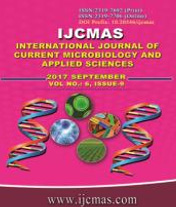


 National Academy of Agricultural Sciences (NAAS)
National Academy of Agricultural Sciences (NAAS)

|
PRINT ISSN : 2319-7692
Online ISSN : 2319-7706 Issues : 12 per year Publisher : Excellent Publishers Email : editorijcmas@gmail.com / submit@ijcmas.com Editor-in-chief: Dr.M.Prakash Index Copernicus ICV 2018: 95.39 NAAS RATING 2020: 5.38 |
Metal remediation through conventional technologies in Common Effluent Treatment Plants (CETPs) is often inefficient or very expensive, whereas, bioremediation by using heavy metal resistant microorganisms has received a great deal of attention for its potential application in industry. The present study was envisaged to check the physico-chemical properties of effluents being treated at CETPs and to isolate indigenous heavy metal tolerant bacteria for their subsequent utilization for heavy metal uptake. Effluent samples were collected from two CETPs located in Ludhiana and Jalandhar and were analyzed for their physico-chemical parameters (dissolved oxygen (DO), biological oxygen demand (BOD), chemical oxygen demand (COD) and pH) and heavy metal profile using Inductively Coupled Argon Plasma-Emission Spectroscopy (ICAP-AES). In both the samples Cr was found to be the dominant metal contaminant. Out of twenty one bacterial isolates obtained from effluent samples, ten morphologically distinct isolates were tested for minimum inhibitory concentration (MIC) against six different heavy metals i.e. As, Cr, Hg, Ni, Pb and W by supplementing the Luria Bertani (LB) agar media with increasing dose of heavy metal salts (5-100 ppm). Four isolates (HM 2, HM 3, HM 15 and HM 16) showed maximum tolerance to selected five different heavy metals except mercury (Hg). These isolates were biochemically characterized, whereby, HM 3 and HM 16 were closely related to Enterobacter and HM 2 was found to be related to Klebsiella. Optimum growth of selected isolates was obtained at pH 9.0 and temperature 40°C. Of these four isolates, only HM 2 and HM 16 showed comparable growth rate and in-vitro compatibility and were selected as potent candidate for consortium.
 |
 |
 |
 |
 |